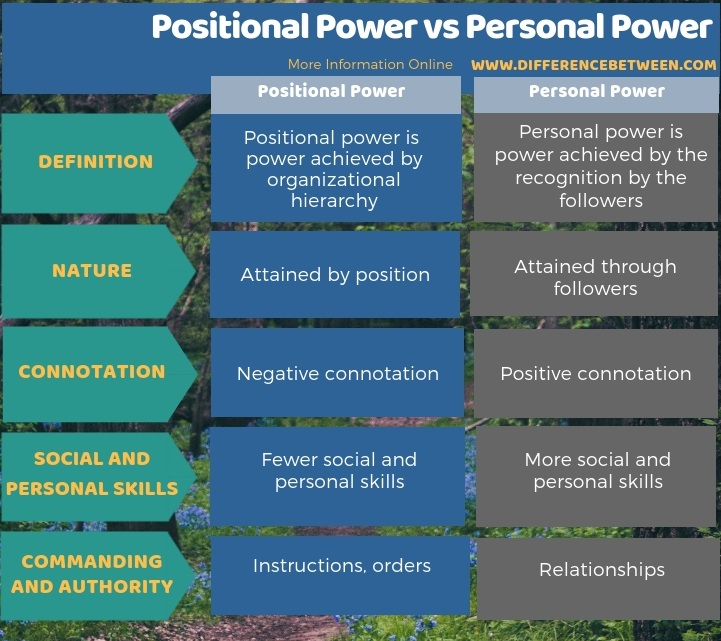The key difference between positional power and personal power is that positional power is achieved by organizational hierarchy, whereas personal power is achieved by the recognition by the followers.
Power can influence and control other people or change an outcome. Although it is invisible, it is the ability to control and direct activities of people. The manager is the most influential or powerful player in a team. He can use this power for the betterment of people by becoming a voice for the voiceless. On the contrary, a manager or a leader can also use power as a tool to dominate and control others. Basically, they have a choice to use power in a constructive or destructive manner.
CONTENTS
1. Overview and Key Difference
2. What is Positional Power
3. What is Personal Power
4. Relationship Between Positional Power and Personal Power
5. Side by Side Comparison – Positional Power vs Personal Power in Tabular Form
6. Summary
What is Positional Power?
Positional power refers to the use of authority to direct a task or get it done. It is a type of power an individual exerts over others. Positional power is basically a result of ones’ position. In the context of business, it is a result of an organizational hierarchy or job rank. In other words, positional power comes by an individual’s title. For example, imagine a power a manager has over his or her employees.

It is possible to apply positional power in different ways. For instance, parents can force their children to do some work using the authority parents have. Another example is the coercive power of political leaders like North Korean President, Kim Jong Un.
However, there are certain problems with the concept of positional power. In the context of business and management, the word power may have a negative connotation. It is mainly because of the misuse or overuse of power by people in managerial positions.
What is Personal Power?
Personal power refers to the power given to an individual by others. That individual receives this power because of his competence or expertise. Sometimes, this power may be simply based on the fact that people prefer this individual over others.
Thus, factors like confidence, positive attitudes, strength and competence of an individual are important in personal power. It is more like an attitude or an impression that others have about a specific individual. Furthermore, personal power represents a movement towards self-realization and its own targets in life. Personal power is more enlightened by creativity, generosity, personality, vision and service. Therefore, we can call personal power a positive power. By understanding the basic elements of personal power, a person can train himself to be an effective and ethical leader.
What is the Relationship Between Positional Power and Personal Power?
Power is an essential factor in the workplace. We usually need the power to get tasks done, meet targets and standards and finally to keep customers happy. Positional power and personal power are two ways in which power can be used in the workplace. A manager or a leader can use one of these types or a blend of both types to get a maximum effect. However, the type of power of use – positional power or personal power – very often depends on specific situations.
What is the Difference between Positional Power and Personal Power?
The key difference between positional power and personal power is that positional power is attained by job position, whereas personal power is attained by the recognition of followers. Positional power is the ability to induce other people due to the position in the organization. On the contrary, individuals who derive their power from their followers are considered to have personal power.
In general, positional power comes with a negative connotation since most leaders overuse or abuse their power to rule. However, personal power comes with a positive connotation. Moreover, positional power does not depend on personal and social skills of the leader, whereas personal power depends on personal and social skills of the leader. So, this is also a significant difference between positional power and personal power.
Moreover, a further difference between positional power and personal power is that the personal power is based on relationships, not instructions, while the positional power does not rely on relationships, and it is based on orders and instructions to follow. Basically, personal power can motivate and empower people, whereas positional power can get jobs done as per the timeline.

Summary – Positional Power vs Personal Power
The key difference between positional power and personal power is that a leader can achieve positional power by organizational hierarchy, whereas he or she can only achieve personal power by the recognition by the followers. Moreover, positional power has a negative connotation, while personal power has a positive connotation.
Reference:
1. Firestone, Robert W. “Personal Power.” Psychology Today, Sussex Publishers, Available here.
2. Steinbrecher, Susan. “How to Use Your Power for Good, Not Evil.” Inc.com, Inc., 28 July 2014, Available here.
3. Suderman, Jeff. “Leaders and Power.” Suderman Solutions, Available here.
Image Courtesy:
1. “2206099” (CC0) via Pixabay
ncG1vNJzZmivp6x7pbXFn5yrnZ6YsqOx07CcnqZemLyue8OinZ%2Bdopq7pLGMm5ytr5Wau268zqygraGfo66tec%2Borp6qXZa7pXnPnqmsp56WuW68zrCcq2c%3D